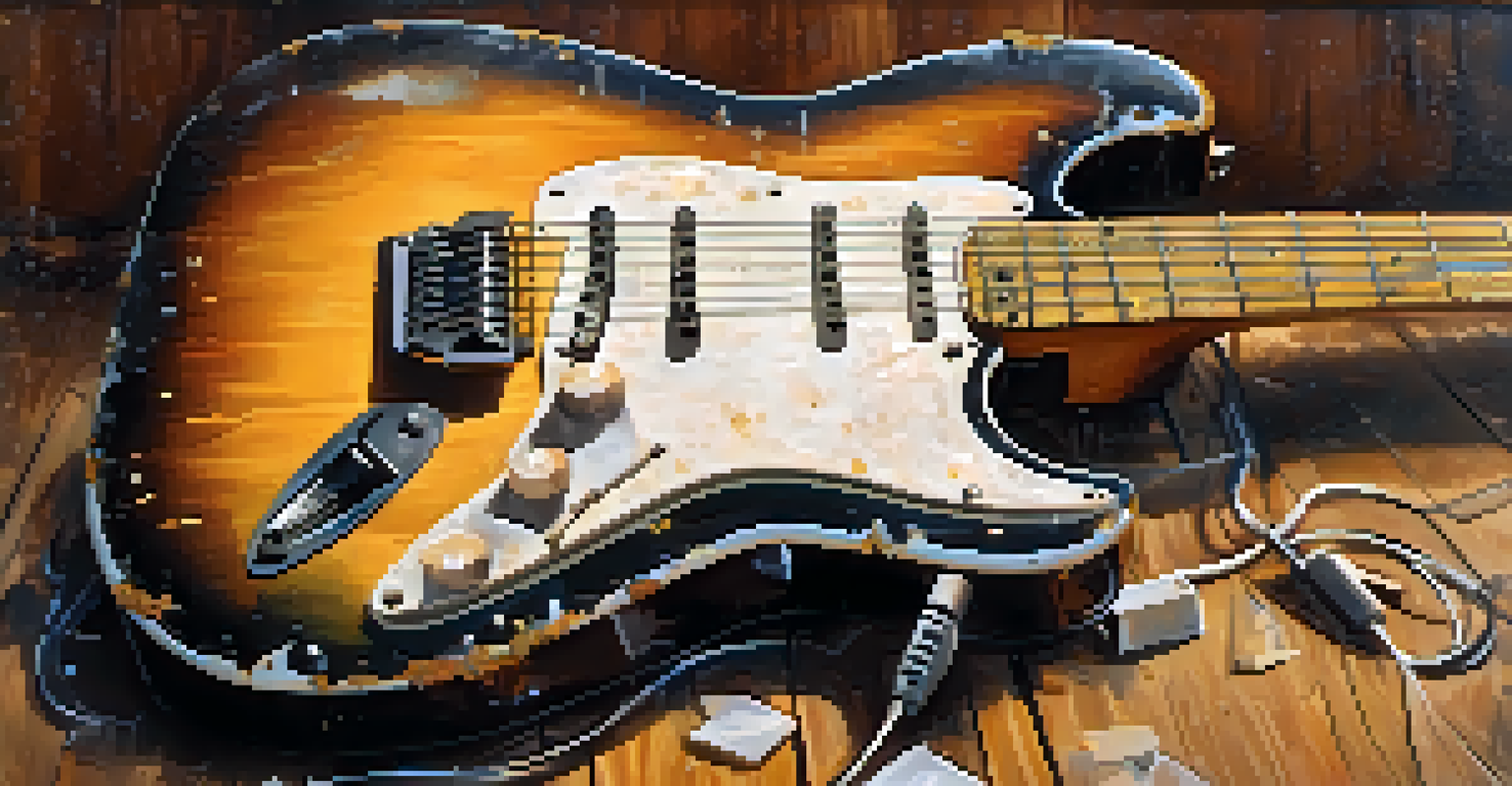The Rise of Grunge: Guitar's Impact on 90s Music

Understanding Grunge: The Sound that Defined a Generation
Grunge emerged in the late 1980s and took the music scene by storm in the early 90s. This genre, rooted in punk rock and heavy metal, was characterized by its raw sound and emotionally charged lyrics. Bands like Nirvana and Soundgarden were at the forefront, using distorted guitars to convey feelings of angst and disillusionment. It was more than just music; it became an anthem for a generation grappling with social and personal issues.
Grunge is not just music; it's a lifestyle that encourages individuality and self-expression.
The grunge sound was defined by its heavy guitar riffs and a lo-fi aesthetic, which set it apart from the polished pop music of the time. This authenticity resonated deeply with listeners who craved something real and relatable. The blend of melody and aggression in grunge music captured the complexities of youth during a time of considerable change, making it a powerful voice for the masses.
As grunge gained popularity, it created a cultural shift in music consumption and fashion. The signature flannel shirts, ripped jeans, and combat boots became symbols of this movement, reflecting a rejection of the mainstream. Grunge wasn't just a sound; it was a lifestyle that encouraged individuality and self-expression.
Key Figures: The Icons of Grunge Music
When discussing grunge, it's impossible not to mention Kurt Cobain, the iconic frontman of Nirvana. Cobain's songwriting was deeply personal and often explored themes of alienation and despair, making his voice incredibly relatable. His tragic death in 1994 only amplified the legacy of both him and the band, solidifying Nirvana's place in music history.

Other influential bands like Pearl Jam and Alice in Chains also played crucial roles in the grunge movement. Eddie Vedder's powerful vocals and heartfelt lyrics resonated with fans, while Alice in Chains blended harmonies with dark themes, creating a unique sound. Together, these artists shaped the landscape of 90s music and influenced countless musicians in the years to follow.
Grunge: A Voice for a Generation
Grunge emerged in the 90s as a powerful musical movement that expressed the angst and disillusionment of youth during a time of significant societal change.
These bands not only dominated the charts but also influenced a wave of emerging artists who sought to emulate their raw sound and attitude. The impact of these key figures can still be felt today, as their music continues to inspire new generations of musicians and fans alike.
The Role of Guitar: Crafting the Grunge Sound
At the heart of grunge music is the electric guitar, which helped define its signature sound. The use of heavy distortion and unconventional tunings gave the guitar a gritty edge that matched the emotional intensity of the lyrics. Guitarists like Kurt Cobain and Jerry Cantrell experimented with different effects, creating a sound that was both innovative and accessible.
Music is the shorthand of emotion.
Chords like the power chord became staples in grunge music, allowing even amateur musicians to replicate the sound. This accessibility contributed to the genre's rapid growth, as young people picked up guitars to express their own angst and frustrations. The simplicity in the guitar work often belied the depth of the emotions conveyed, making it relatable to a wide audience.
Moreover, guitar solos in grunge often took a backseat to lyrical storytelling, marking a departure from the flashy displays of virtuosity seen in previous rock genres. This shift emphasized the importance of song structure and emotional connection over technical prowess, aligning with the grunge ethos of authenticity and rawness.
The Cultural Context: Grunge and 90s Society
The rise of grunge coincided with significant cultural shifts in the early 90s, particularly among youth. Economic downturns, political changes, and a sense of uncertainty created a backdrop for the grunge movement. Music became a means of expressing discontent and a way for young people to process their collective experiences during this tumultuous time.
Grunge music often tackled issues such as depression, addiction, and societal pressures, resonating with listeners who felt similarly lost. The lyrics served as a mirror to the struggles of a generation, providing solace and understanding. It was this connection that allowed grunge to flourish and become a pivotal part of 90s culture.
Cultural Impact of Grunge Fashion
The grunge movement influenced not only music but also fashion and attitudes, promoting individuality and open discussions about mental health.
As youth culture began to embrace grunge, it also influenced various aspects of society, including fashion, art, and even attitudes towards mental health. The movement encouraged open discussions about feelings and experiences that were often stigmatized, leading to a broader acceptance of vulnerability and emotional honesty.
The Decline of Grunge: What Happened?
By the mid-90s, grunge began to decline in popularity, giving way to new genres like pop-punk and nu-metal. The very essence of grunge, which thrived on authenticity and anti-commercialism, faced challenges as mainstream media began to commodify the movement. Major labels sought to capitalize on the success of grunge bands, leading to a dilution of its original spirit.
Tragically, the deaths of key figures like Kurt Cobain marked a turning point for the genre. With Cobain's passing, many fans felt a sense of loss, and the vibrant energy of the grunge scene began to fade. The genre that once empowered a generation now felt like a relic of the past, overshadowed by the rise of new musical trends.
Despite its decline, the legacy of grunge remains strong. Many of the themes and sounds of the genre continue to influence modern music, as artists draw inspiration from the emotional honesty and raw power that grunge embodied. The genre may have waned, but its impact on music and culture is indelible.
Grunge's Lasting Influence on Modern Music
Although grunge may have peaked in the 90s, its influence is still evident in today’s music scene. Many contemporary bands, like Foo Fighters and Royal Blood, carry the torch of grunge's heavy guitar riffs and introspective lyrics. This blending of old and new keeps the spirit of grunge alive, reminding us of its powerful legacy.
Additionally, the emotional authenticity that characterized grunge continues to resonate with modern artists. Genres like indie rock and alternative music often draw on the themes of disillusionment and vulnerability that grunge popularized. The connection to real-life experiences remains a hallmark of the music we hear today, echoing the sentiments of the 90s.
Legacy of Grunge on Modern Music
Despite its decline, grunge's emotional authenticity and heavy guitar sound continue to inspire and resonate with contemporary artists and genres.
Moreover, the resurgence of interest in vinyl and retro sounds has led to a renewed appreciation for the grunge era. Young musicians are rediscovering the raw power of this genre, leading to a new wave of music that pays homage to the past while forging its own identity.
Conclusion: The Legacy of Grunge in Music History
Grunge was more than just a music genre; it was a cultural phenomenon that redefined the musical landscape of the 90s. It gave a voice to a generation grappling with complex emotions and societal issues, and its impact still resonates today. The raw sound of grunge and its focus on authenticity have paved the way for countless artists who continue to draw inspiration from its legacy.
As we look back on the rise of grunge, we can appreciate how it challenged norms and encouraged self-expression in a way that was both powerful and necessary. The guitar-driven sound that characterized this movement has left an indelible mark on the music industry, influencing both past and present artists.

Ultimately, grunge serves as a reminder of the importance of music as a form of expression and connection. The genre's enduring legacy encourages us to embrace our own vulnerabilities and find solace in the shared human experience through music.